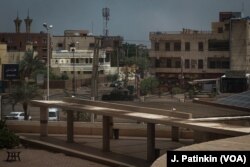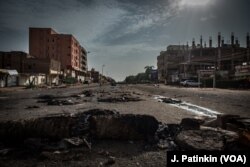The death toll from Monday's attacks on pro-democracy protesters by Sudanese government forces rose to at least 60 Wednesday, according to doctors linked to the protesters.
Now, details are emerging on what appears to have been a brutal, coordinated assault on protesters in central Khartoum, and those who tried to help the wounded.
Sudan’s ruling Transitional Military Council has claimed the security forces that raided the main protest site Monday only moved on criminal elements among the protesters, but survivors at Royal Care Hospital being treated for wounds told another story.
On Tuesday, VOA gained rare access to the Royal Care hospital, where many survivors of the massacre have been taken for treatment.
Witnesses and survivors blamed the attacks on the notorious Rapid Support Forces — a militia from Darfur led by the deputy chief of the ruling Transitional Military Council, Mohamed Hamdan Dagalo.
Police officers also have also been accused of taking part in the assault, but multiple witnesses said they were RSF troops wearing police uniforms, based on their accents and behavior.
Merdat Khadir, in a wheelchair, said the RSF attacked once the regular army, which previously defended protesters, was unarmed or not present.
"They started attacking people once they knew that the army was no longer able to fight back," he said. "They were godless, they had no souls, these people are not Sudanese, we don't accept them among us. Even the dead, they were beating the dead who were on the ground."
Student Mohmoud Abdulla, 25, showed bruises all over his back and shoulders and his right arm was in a sling.
He said after the RSF chased them from the streets, he hid with other students in Khartoum University’s dormitories within the protest site.
"It was the only place we could find to hide," he said. "They said to us to come out, when we didn't come out they threw tear gas inside, and then pointed their weapons at us ... I opened the door to let them in, and they slapped me on both sides of the head and I fell to the ground and they started beating me."
"There were maybe 25 of them, hitting me with sticks, whips, the butts of their guns, whatever," he added.
The abuse didn't stop there. The soldiers told him to run out of the building, past a line of waiting soldiers.
"It was like running through a minefield," he said. "There were so many of them and they all were whipping me. When I reached a clinic, I passed out."
But after waking, Abdulla saw that the troops had also entered the medical clinic.
"They beat the clinic people, saying, 'why are you helping him?' And one of the clinic people had his arm broken. They were whipped for trying to help me," he said. "This is the ugliest human treatment possible. We did not think there would come a day when this would happen to us here."
Attacks on medical facilities treating injured protesters continued after Monday's massacre. Witnesses in Royal Care hospital said troops fired on the facility on Tuesday morning, where many protesters and relatives had gathered to check on wounded loved ones.
Mohamed Ibrahim said he was in Royal Care with his father, who needs surgery for an injury unrelated to the protests, when he saw machine gun mounted pick-up trucks heading towards the hospital. Looking through hospital windows, he said he saw them aim them at people gathered outside, before diving to the ground to avoid any stray bullets.
"They assaulted both revolutionaries and doctors. We tried to get outside the hospital but we couldn't get out," he said. "I saw the shooting that was on the entrance of the hospital, and there was one doctor injured."
While reporters interviewed the wounded later on Tuesday, the RSF returned, surrounding the building. Staff and patients quickly switched off the lights and hid in locked closets and bathrooms until the threat disappeared.
Many patients and their relatives and friends fled the hospital, fearing another attack.
But 21-year-old Saha Omar said she couldn't leave her father, who was waiting for brain surgery.
"We hide inside the hospital, in the room. The hospital staff asked us to stay in the room with every patient and not to leave the rooms," she said. I'm very worried. My fear is that they're gonna come into the hospital and just start shooting, because nothing can stop them. There's really nothing can stop them right now."
One volunteer bringing food to wounded protesters, who did not wish to be named, said patients would suffer if the harassment continued.
"There is no staff that can reach the hospital. Doctors and other staff cannot reach the hospital," he said. "We are now try[ing] to call the doctors, we have a lot of cases of open fractures that need urgent, urgent, urgent, operation. But doctors cannot reach the hospital."
With even hospitals coming under attack, it seems nowhere is safe in Sudan's capital from the security crackdown.






